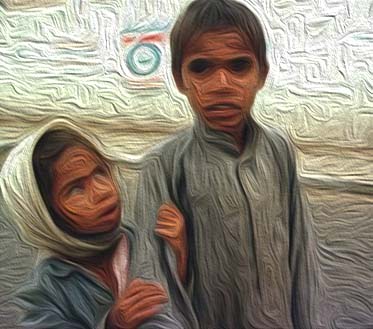
by Abdullah Hamidaddin, Alarabiya.net, March 28, 2014
Maha is a 10 year old girl. She is the youngest of twelve and is now getting ready for her big day. She is to be married to a man who is thirty seven years old. Her mother is packing her bag. It’s a small bag. The family is so poor that Maha barely has ten pieces of clothes all together. Before she closes the bag, the mother puts in two plastic dolls. Maha found them while foraging for toys with her friends in the trash of an upscale neighborhood in Sanaa. I wonder what the mother is thinking now. She must be happy that Maha will have three meals a day. Before her engagement, Maha would only eat one meal daily and sometimes she had to sleep hungry. Now things seem brighter than before. The father spent part of her dowry on some food to fatten Maha up. Her fiancé remarked that she was getting too thin, and her parents were worried that he would call off the engagement started so they started feeding her more. Maha of course didn’t understand why she was eating alone. Why her mother wouldn’t share her oat meal and fresh cow’s milk. Meat was too expensive; but they would make soup from the fat which butchers usually throw away or feed the stray cats with.
I can’t imagine what Maha is thinking right now. I can’t imagine what she will be thinking when she is in a bedroom with her husband. How will she face her nakedness in the presence of this stranger? How will she look at his hairy body? It is such a disgusting thought for me. How is it for her? Does she see it that way? Well, everyone is excited. For the parents: one mouth less to feed; one less suffering to watch every day. For Maha: she will eat better, and she was told that she has a real bed to sleep on.
60 percent of Yemenis starve while their political leaders spend hundreds of millions of dollars yearly in political wheeling and dealing
Abdullah Hamidaddin
Maha is lucky, the parents think as they watch her walk away with her husband.
Maha’s story is not unique. Perhaps it is unique for those who stand by her; they consider her lucky. She – as far as her peers are concerned – was able to move up and cross the extreme poverty line. But from where I stand Maha’s predicament is that of millions of Yemenis and billions more around the globe.
Obscenity
The numbers are there, and repeating them is becoming an obscenity. Even if I repeat them, do any of us really know what those numbers mean? They are too large for our minds to imagine. Can anyone of us fathom the death of a child every few seconds? Can we really comprehend the millions and millions of hunger pangs? Can we come close to the heart aches of billions of mothers every single second?
Here I must pause. I find it very difficult to write about Maha or anyone in such dire poverty. I feel disingenuous. Here I am sitting in a fancy coffee-shop typing off some words about a person I will never meet, nor see, nor share an experience with. To add to the irony Jason Mraz’s “life is wonderful†is playing in the background! I also find it hypocritical to write about poverty in Yemen alone. The image of Maha summons so many faces from around the globe and I feel it immoral to speak about the poor of a specific nation. Does poverty have a nationality? Is human suffering bounded by Westphalia?
Yet I write.
Another painful story I read was that of Um Saleh. She is a beggar who wakes up every morning to beg in one of Sanaa’s busy areas. She spoke of a handicapped six year old child whom she called Mohammad. She said that someone brings him and puts him near a bank where he is to beg all day. In the afternoon someone passes to collect and he is left again for the rest of the day. No food. No water. Um Saleh was actually crying while she spoke about Mohammad. This is really beyond me. What degree of suffering was Muhammad going through to make a fellow beggar – with her own set of suffering – cry? Um Saleh is a mother of two, and she begs to feed them, yet the story of Mohammad broke her heart. I would have thought suffering makes us more selfish, survivalists, cold hearted. But in reality it’s our hearts which have grown cold and indifferent.
Studies show that 60 percent of the people of Yemen are extremely poor. They starve while their political leaders spend hundreds of millions of dollars yearly in political wheeling and dealing. While the World Bank imposes conditions that only helps the rich. While the United States demands that the government focuses most of its attention on the security of the U.S.. While Gulf countries are squandering billions on corrupt Yemeni leaders. While the middle class citizens of the Gulf come to Yemen looking for cheap child brides to enjoy for a summer.
What I hate most about writing about human suffering is that once I am done, I will go on my life. I will email this to my editor. Order a meal. Enjoy a drink. Later, I will join my friends for a night out. I will forget. But the suffering will not.
______________________
Abdullah Hamidaddin is a writer and commentator on religion, Middle Eastern societies and politics with a focus on Saudi Arabia and Yemen. He is currently a PhD candidate in King’s College London. He can be followed on Twitter: @amiq1